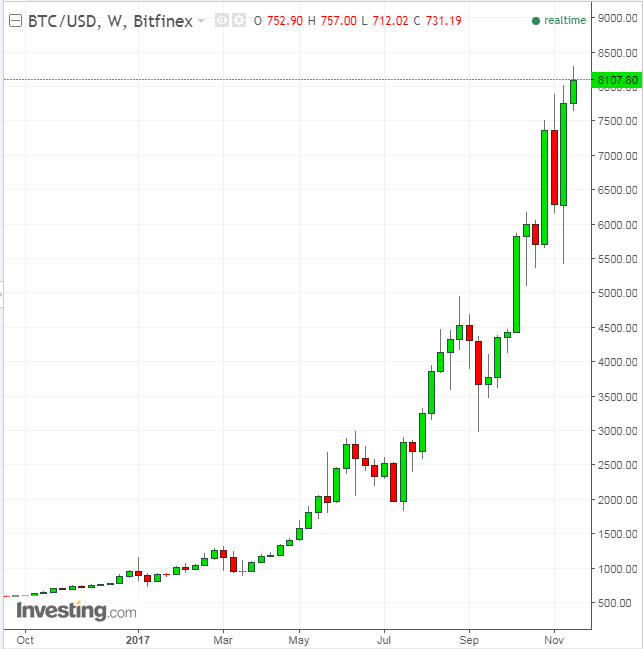by Tanzeel Akhtar
As the world’s leading cryptocurrency, Bitcoin continues to show how relentless it is. Even after its most recent volatile rally, Bitcoin continues to defy the bubble rumor. It could well be the new digital gold, or a once-upstart currency that's now here to stay.

As of this past Sunday, November 19, Bitcoin hit yet another milestone, smashing past $8,000 per coin.
While upgrades have been made to Bitcoin along the way in order to increase both its scalability and transaction size and velocity, is it possible the digital currency is becoming less of a payment network, instead evolving into digital gold? Could it be that Bitcoin is actually struggling with identity issues?
The recent failure of SegWit2x had shaken Bitcoin, at least initially, sending the price down. The SegWit2x hard fork was intended to decrease transaction costs and improve confirmation speed but was suspended due to lack of consensus between developers. Is there an internal ongoing struggle investors need to be aware of?
Eddy Travia, CEO of Coinsilium, an investor and accelerator of blockchain technology companies, believes it's quite clear Bitcoin's primary function today, regardless of the forks, is to be a “store of value.” He's certain that most see it as an investment vehicle rather than as the currency of a peer-to-peer electronic cash system.
Gabriele Giancola, CEO and co-founder of qiibee, an internet loyalty platform, disagrees:
I don’t believe it is struggling with its identity. The SegWit2x and SegWit discrepancy is now eliminated. With that, the core developers are fully concentrated on bringing the Segwit and lightning network on-chain. To say that Bitcoin or its identity is struggling is not considering the whole picture. The cancellation of SegWit2x shows that the community is standing together.
Dmitry Zhulin, co-founder at INS Consumer Ecosystem, interprets the current situation a bit differently. As he explains it, Bitcoin is transitioning out of its childhood years, maturing into digital gold. He says:
While Bitcoin was built on a sort of open-source ethos that has driven generations of ‘geeks,’ this development clearly shows that bitcoin has come out of its childhood and is moving towards its destination—a universal means of preserving capital or ‘digital gold.'
David Moskowitz, CEO and co-founder at Indorse, thinks the decision not to follow through with the SegWit2x fork was a strategic move by Bitcoin supporters, who shifted their support to Bitcoin Cash. Moskowitz points out they did this to help boost the price of both currencies, as well as bolster interest in BCH. The long-term plan? To implement on-chain scaling solutions once more significant traction is made in that fork.
“Many people, especially the early supporters of Bitcoin, believe that it is, and should continue to be more than a store of value, that it should also be a global means of payment and they will continue to work towards that goal.”
Fernando Gutierrez, Head of Legal at Dash, argues that at this point, at its core Bitcoin is still more like digital cash than anything else, despite the fact its shift away from digital cash has been more visible recently:
Thanks to Bitcoin being open source, it has been possible for other groups to pursue Satoshi Nakamoto's vision of an 'Electronic Cash System,' that the Bitcoin Core Developers abandoned well before failure of SegWit2x. This shift has been more visible recently with new projects forking and claiming the Bitcoin name for themselves, but other projects like Dash started using Bitcoin code to build a payments network more than three years ago.
In the long run, fights over names won't matter. What will matter is that users will have a solid option for their payments, be it Dash, Bitcoin Cash or maybe a new project yet to be launched.
CoinDesk's Director of Research, Nolan Bauble, notes that Bitcoin is clearly behaving as a “crisis currency” in places such as Venezuela and Zimbabwe where fiat currencies have lost significant value and government stability has broken down. "We can see that the market identifies Bitcoin as a store of value,” he says.
Clearly, the failure of one fork, SegWit2x, and the success of another, Bitcoin Cash, both strengthened the digital currency in similar ways by proving the point that Bitcoin is anti-fragile. Bauble says:
That is, Bitcoin convinces more people it is a secure store of value every day it survives. This behavior looks like the history of gold as a store of value. Gold too survived the end of gold coinage, the rise of paper money, and the end of the gold standard.”
As Bitcoin matures it will evolve to a point where it will surely find its appropriate place in the investment universe. For now, as the cryptocurrency asset class continues to gain traction, the debate over what Bitcoin actually is—cash or digital gold—will likely continue. And perhaps, at least at the moment, it's actually a bit of both.
